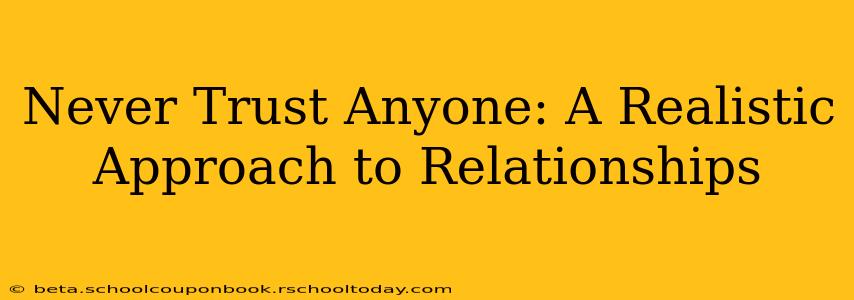The phrase "never trust anyone" is a cynical, albeit attention-grabbing, statement. While it's important to approach relationships with a healthy dose of caution and self-awareness, completely dismissing trust is unrealistic and ultimately self-defeating. This article explores the complexities of trust in relationships, offering a balanced perspective that acknowledges both the risks and rewards of vulnerability. We'll move beyond the extreme and explore how to navigate relationships with discernment and emotional intelligence.
Is it Realistic to Never Trust Anyone?
No, it's not realistic to never trust anyone. Human connection relies on a degree of vulnerability and faith in others. Complete distrust isolates us, hindering our ability to form meaningful bonds and experience the joys of intimacy and companionship. While skepticism is a valuable tool, a complete lack of trust creates a self-fulfilling prophecy, often leading to strained and ultimately unsuccessful relationships.
Why Do People Say "Never Trust Anyone"?
The sentiment behind "never trust anyone" usually stems from past experiences of betrayal, manipulation, or disappointment. These painful experiences can leave deep scars, making it difficult to trust others. It's a defense mechanism, a way to protect oneself from further emotional harm. However, it's important to understand that this is a reaction to specific negative events, not a universal truth about human nature.
How Can I Build Trust in a Relationship?
Building trust is a gradual process that requires time, effort, and consistent demonstration of reliability. It's not a switch you can flip on or off. Key elements include:
- Open and Honest Communication: Honest communication is the bedrock of any healthy relationship. Being open about your feelings, thoughts, and experiences fosters a safe space for vulnerability.
- Consistency and Reliability: Following through on your promises, both big and small, demonstrates your trustworthiness. Consistent actions speak louder than words.
- Respect for Boundaries: Respecting each other's personal boundaries is crucial. This includes respecting privacy, opinions, and personal space.
- Empathy and Understanding: Showing empathy and seeking to understand your partner's perspective strengthens the bond and fosters trust.
- Forgiveness: Mistakes happen. The ability to forgive and move forward from transgressions is vital for maintaining trust.
What are the Signs of a Trustworthy Person?
Identifying trustworthy individuals isn't about finding perfection, but recognizing consistent behaviors and patterns. Look for individuals who:
- Are accountable for their actions: They take responsibility for their mistakes and don't make excuses.
- Keep their commitments: They follow through on their promises, big or small.
- Respect your boundaries: They understand and honor your personal limits.
- Are empathetic and understanding: They strive to see things from your perspective.
- Are honest and transparent: They communicate openly and honestly, even when it's difficult.
How Do You Deal With Betrayal in a Relationship?
Betrayal is a deeply painful experience that can severely damage trust. Dealing with it requires time, self-reflection, and often, professional guidance. Important steps include:
- Allow yourself to feel your emotions: Don't suppress your pain, anger, or sadness. Allow yourself to grieve the loss of trust.
- Seek support: Talk to trusted friends, family members, or a therapist. Having a support system can make a huge difference.
- Understand the situation: Try to understand what happened and why, but avoid dwelling on blame.
- Decide if you can forgive and move forward: Forgiveness is a personal choice, not a requirement. It's crucial to prioritize your own well-being.
Conclusion: A Balanced Approach to Trust
The adage "never trust anyone" is a harmful oversimplification. While skepticism and self-protection are essential, complete distrust prevents us from forming meaningful connections. Cultivating healthy relationships requires a balanced approach – being discerning and cautious while also embracing the vulnerability necessary for intimacy and connection. It's about learning to trust wisely, not never trusting at all.
